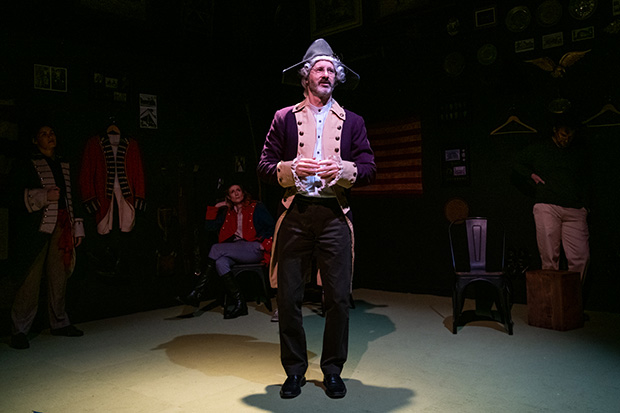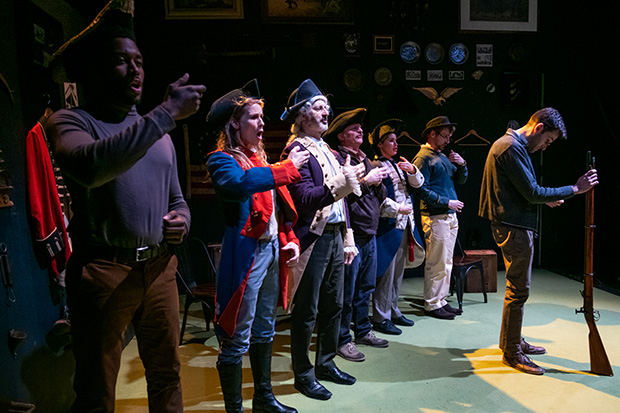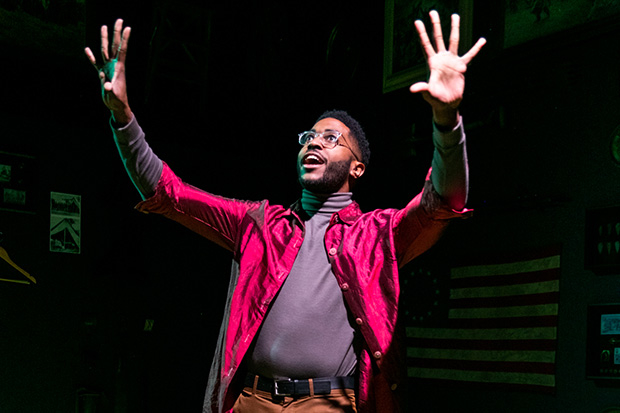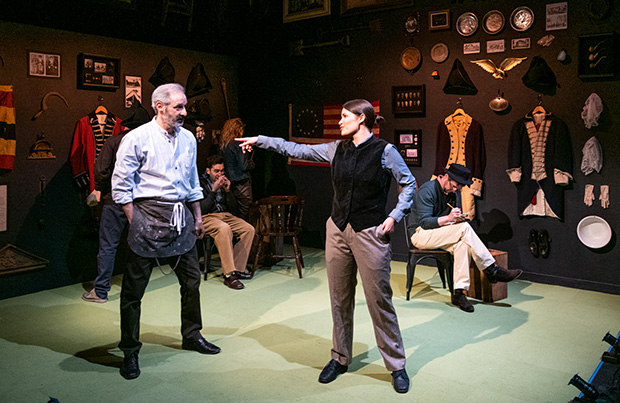How to Load a Musket Takes Aim at Historical Reenactment
Talene Monahon’s new documentary play explores why some Americans dress up in Civil and Revolutionary War uniforms.

(© Russ Rowland)
"There are moments when you disappear and your character takes over," confesses Hal. It's a sensation any decent actor has shared, and Hal is an actor of sorts: He's a Revolutionary War reenactor, specializing in portraying British officers. He's one of several memorable characters in Talene Monahon's enthralling new documentary play at 59E59 Theaters, How to Load a Musket, which is about this very popular form of folk theater. Simultaneously entertaining, informative, and sleekly produced by Less Than Rent Theatre, Musket hits the bullseye.
Based on interviews Monahon conducted with Civil and Revolutionary War reenactors over the course of several years, Musket introduces us to people like Terry (an instantly likable Lucy Taylor), a sixtysomething Massachusetts woman who took up reenactment because she thought it would be fun to dress in costume and play the fife. There are old-timers like Tom (an endearingly crusty Ryan Spahn) and Bill (Adam Chanler-Berat, feeling the role in every bone of his body), who have deep reverence for historical accuracy (Bill actually teaches us how to load a musket).

(© Russ Rowland)
Then there's Jeffrey (Richard Topol, simultaneously avuncular and menacing), a man who plays Confederate soldiers as a way of honoring his ancestors; he considers the removal of Confederate monuments a "genocide" against his heritage. And in case you think this is just a hobby for old men, there's 17-year-old Brian (also Taylor), a future Marine who, when asked what he would have done if he had been 17 in 1861, bluntly responds, "I would have fought for Virginia."
Monahon has dedicated Musket to the late composer Michael Friedman, and it is easy to see his influence over the play. Musket is reminiscent of Friedman's best work with the investigative theater company the Civilians. Monahon takes a quirky topic and makes it seem not only relatable, but quietly indispensable to the current American moment. She does this through an honest portrayal of her subjects, in all of their glorious contradictions. They speak directly to us and defy our preconceived notions of who we might encounter at a Civil War reenactment.

(© Russ Rowland)
"Yeah, we're around," says Lucien (a no-nonsense David J. Cork), responding to Monahon's obvious surprise at encountering a black participant in this hobby. For Lucien, it is important to represent the lives of black Americans in this venue, lest this history become completely whitewashed. Cork totally transforms his voice and physicality to portray Dread Scott, a black performance artist who recently organized his own historical reenactment (albeit with a revised ending) of the 1811 German Coast uprising, an unsuccessful slave rebellion that took place outside of New Orleans. Scott (who took his name from Dred Scott, a slave who sued for his freedom in the Supreme Court and lost) makes a compelling (and alarming) argument for violence as an accelerant to American history. For him, the Civil War is something to be celebrated — an opinion he shares with the white reenactors.
Much of Musket is very funny, like the section about a Fraunces Tavern love connection between a George Washington (the Santa Claus of this world) and his Martha (this courtship is giddily enacted by Topol and Chanler-Berat). But what begins as a comedy in 2015 stealthily shifts to tragedy as the 2016 election comes and goes, followed by the terrible events of Charlottesville, Virginia, in the summer of 2017. We watch as historical reenactment becomes yet another battleground in the culture wars, turning what seemed like an innocuous hobby into a symbol of white supremacy. Of course, all of its participants vehemently deny that they are racist. "I'm sorry. Most people don't want to speak with you now," says a visibly distraught Tom. "This whole thing has become so political." But perhaps it was always political, as history usually is.

(© Russ Rowland)
Musket bursts with competing ideas, and director Jaki Bradley impressively keeps them from becoming muddled in a production that feels fully realized without ever getting in the way the consistently excellent performances. Lawrence E. Moten III hangs all of the props and costumes (by Olivia Vaughn Hern) on two upstage walls, making this corner set resemble an anachronistic Cracker Barrel. The performers easily shift between characters, lifting props and costumes off their hooks. Stacey Derosier conjures a sense of time and space with her uncomplicated lighting, and sound designer Jim Petty underscores the scenes with the sounds of gunshots, classic American folk music, and original tunes by Zoe Sarnak. A later sound cue that evokes more modern weapons serves as a blunt reminder that the "end of history" was always a ludicrous pipe dream.
Despite the unresolved note of conflict on which it ends, shows like Musket give me hope that American lives are so much more complicated than the algorithm smiths at Facebook and Google would have us believe — that we're not ready to be filed away into the Matrix just yet.









